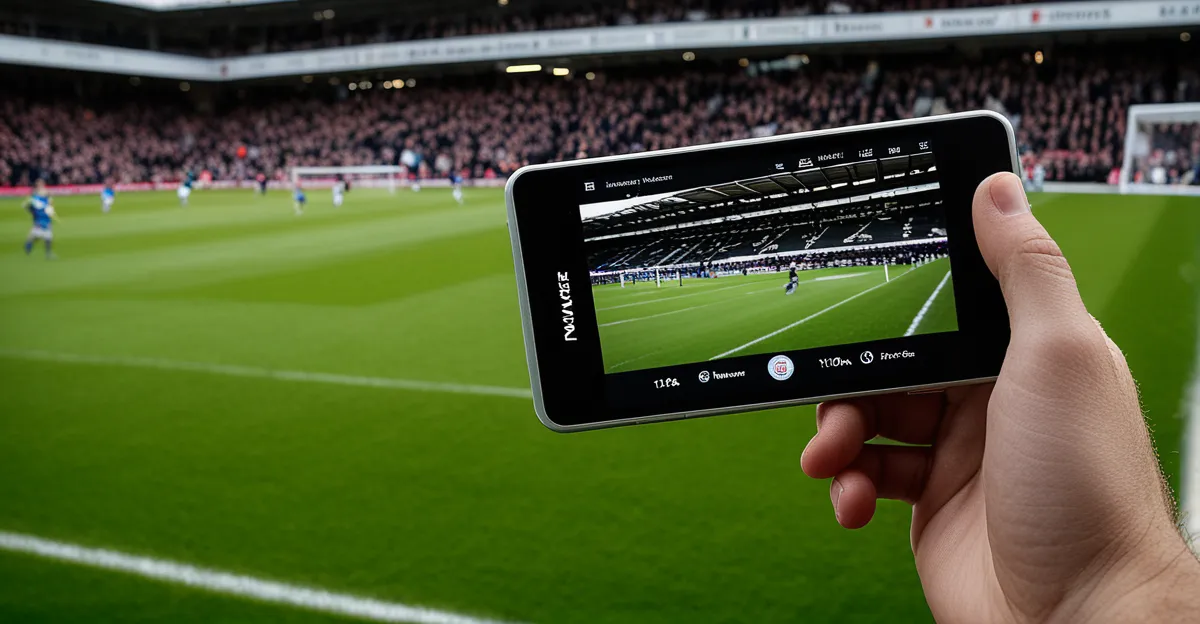How Technology Is Transforming UK Sports Experiences
Technology in UK sports is rapidly reshaping how fans, athletes, and event organizers engage with the game. Digital innovation drives this transformation by enhancing the sports experience on multiple fronts, creating a more immersive and data-driven environment.
For fans, the integration of mobile apps and interactive platforms means easier access to live scores, personalized content, and direct interaction with their favorite teams. Athletes benefit from wearable technology and performance analytics that refine training and optimize recovery. Event organizers use advanced event management software and smart stadium features, improving logistics and audience satisfaction.
Also to read : How Are Weather Conditions Impacting UK Sports Events?
Emerging trends shaping the future landscape of UK sports technology include AI-driven analytics providing deeper insights into player performance and fan preferences, immersive augmented reality experiences that bring events closer to home, and enhanced connectivity through 5G networks ensuring seamless streaming and in-venue services.
In sum, technology in UK sports is not merely a tool but a vital component that enriches engagement, boosts athlete performance, and streamlines event organization, promising a continuously evolving and more inclusive sports culture.
In parallel : What strategies are used to enhance fan experience in UK sports?
Technologies Enhancing Fan Engagement
Small text
The role of fan engagement in UK sports has been revolutionized by digital innovation and technology. Sports streaming services now offer live and on-demand content, allowing fans to follow games anytime and from anywhere. These platforms often include interactive features such as multiple camera angles, real-time statistics, and expert commentary, significantly enriching the sports experience.
Mobile apps tailored for UK sports fans provide personalized content, live updates, and direct communication channels with teams and leagues. Social media integration within these apps fosters community building, letting supporters share opinions, access exclusive content, and participate in interactive polls or contests. This integration amplifies fan involvement beyond the stadium.
Augmented reality (AR) in sports offers immersive experiences both at home and in the arena. For example, AR overlays can display player stats in real-time or simulate game scenarios, deepening fans’ understanding and excitement. In stadiums, AR can guide spectators to their seats or concessions, enhancing convenience and enjoyment. The combination of AR with mobile apps and social media is a growing trend that exemplifies how UK sports technology is transforming how fans interact with their favorite sports.
Together, these advancements contribute to a more connected and dynamic fan environment, reflecting the broader impact of technology in UK sports on engagement.
Innovations Impacting Athlete Performance
Small text
Wearable technology stands at the forefront of innovations impacting athlete performance in UK sports. Devices such as GPS trackers, heart rate monitors, and motion sensors are commonly used to provide real-time performance monitoring. They collect vital data during training and competition, allowing athletes and coaches to make immediate adjustments that optimize outputs and reduce injury risks.
Performance analytics utilize data from these wearables to deliver comprehensive insights into athletes’ physical condition and progression. Metrics like speed, workload, recovery rates, and biomechanical efficiency are analyzed to tailor training regimens and recovery strategies. This data-driven approach enhances decision-making, ultimately improving results on the field.
Training tools are increasingly augmented by this technology, combining hardware and software for a holistic athlete development experience. Examples in UK sports include smart equipment that tracks technique and virtual coaching platforms that offer personalized feedback based on analytics.
Several UK teams and athletes have successfully integrated wearable technology and performance analytics into their routines. These implementations demonstrate measurable improvements such as faster recovery times, enhanced endurance, and injury prevention, underscoring the transformative impact of UK sports technology on professional training environments.
Improving Stadium and Venue Experiences
Small text
Smart stadiums are pivotal in advancing the technology in UK sports, delivering enhanced safety, comfort, and entertainment for spectators. These venues integrate contactless technology and digital ticketing systems, streamlining entry processes and reducing wait times. Fans benefit from quicker access, while event organizers improve crowd management and operational efficiency.
Reliable in-venue connectivity is a cornerstone of the modern sports experience. Enhanced Wi-Fi and 5G networks support seamless streaming, real-time interactions, and mobile app functionality within stadiums. This connectivity enables fans to engage deeply through live statistics, AR features, and social media, all while attending games physically.
Smart stadium features also prioritize safety, such as automated monitoring systems and crowd-flow analytics, which help prevent overcrowding and ensure rapid responses to incidents. Comfort improvements include app-controlled amenities like seat upgrades, food ordering, and navigation assistance through indoor mapping technologies.
By combining digital innovation with user-centric design, these technologies collectively elevate the overall sports experience at venues across the UK, making stadium visits more convenient, engaging, and enjoyable for all.
Increasing Accessibility and Inclusivity in UK Sports
Small text
The advent of technology in UK sports has notably advanced sports accessibility and inclusivity, enabling disabled athletes and fans to participate and engage more fully. Assistive technology—such as adaptive equipment, sensory aids, and communication devices—plays a pivotal role in leveling the playing field. For athletes with physical impairments, smart prosthetics and wearable sensors help monitor performance and tailor training, enhancing competitiveness and safety.
For spectators with disabilities, innovations include audio descriptions for visually impaired fans, hearing loop systems in stadiums, and mobile apps offering personalized accessibility settings. These digital tools improve the overall sports experience, ensuring that everyone can enjoy events without barriers. The integration of such technology reflects growing awareness within UK sports organizations to foster more inclusive sports arenas.
Community and national initiatives further promote inclusivity by funding adaptive sports programs and developing accessible venues. These efforts demonstrate how UK sports technology supports a cultural shift towards equal participation, benefiting athletes and fans alike. Through continuous advancements and commitment, the landscape of UK sports becomes more welcoming and representative of diverse abilities.
Challenges and Considerations in Sports Technology Adoption
Small text
Adopting technology in UK sports involves several notable challenges that must be addressed to leverage its full potential effectively. One significant concern is data privacy, especially regarding athlete performance metrics and fan information collected through digital platforms. Ensuring that sensitive data is securely stored and used ethically remains a priority for teams, event organizers, and technology providers. Fans and athletes alike expect transparency about what data is collected and how it is managed, requiring robust privacy policies and compliance with data protection regulations.
Another critical challenge is the cost associated with implementing advanced technologies. High expenses for devices like wearable trackers, smart stadium infrastructure, and software solutions can restrict access, especially for smaller clubs and community sports organizations. This financial barrier may widen the gap between elite and grassroots levels, limiting widespread benefits of UK sports technology advancements. Strategies to offset costs, such as government funding or partnerships, are therefore essential to promote equitable access.
Additionally, the pace of technology adoption in sports sometimes clashes with traditional practices and stakeholder resistance. Integrating innovative tools requires cultural shifts, training, and sometimes rethinking established workflows. Balancing the desire for cutting-edge innovation with respect for the heritage and spirit of UK sports is an ongoing consideration. Successful adoption depends on inclusive dialogue and demonstrating clear advantages for all users—fans, athletes, and organizers alike.
Addressing these challenges with thoughtful solutions ensures that digital innovation continues to enrich the sports experience while maintaining trust and sustainability within the UK sports ecosystem.











